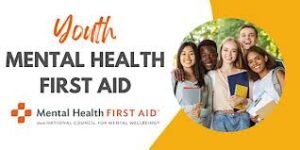


In today’s fast-paced and ever-changing world, young people face a myriad of challenges that can impact their mental health. From academic pressures to social media anxieties, the stresses of adolescence can be overwhelming. As parents, teachers, mentors, and concerned individuals, it’s crucial to equip ourselves with the knowledge and skills to support young people in need. Youth Mental Health First Aid (YMHFA) is a powerful tool that empowers individuals to recognize, understand, and respond to mental health challenges in adolescents.

Adolescence is a critical developmental stage characterized by significant physical, emotional, and social changes. During this period, young people may face various stressors, including academic pressures, social dynamics, and family issues. According to the World Health Organization, mental health disorders such as anxiety and depression are among the leading causes of illness and disability among adolescents[3]. Furthermore, suicide is a leading cause of death in this age group, highlighting the urgent need for effective intervention strategies[11].
YMHFA is a comprehensive educational program that teaches participants how to provide initial help and support to young people experiencing mental health problems or crises. It’s designed to be accessible to individuals from all walks of life, including parents, teachers, school staff, coaches, and community leaders.
Some of the most common mental health issues affecting youth include:
Anxiety Disorders: Characterized by excessive worry or fear that can interfere with daily activities.
Depression: Symptoms include persistent sadness, loss of interest in activities, and changes in sleep or appetite.
Attention Deficit Hyperactivity Disorder (ADHD): Affects concentration and impulse control.
Eating Disorders: Such as anorexia nervosa and bulimia, often emerging during adolescence.
Substance Use Disorders: Increasingly prevalent among teens as they seek ways to cope with stress[7][11].
Early Intervention: YMHFA emphasizes the importance of early intervention. By learning to recognize the signs and symptoms of mental health conditions, we can intervene promptly and prevent problems from escalating.
Reducing Stigma: YMHFA helps to reduce the stigma associated with mental illness by promoting understanding and empathy. By normalizing conversations about mental health, we can create a more supportive environment for young people.
Building Resilience: YMHFA equips individuals with the skills to build resilience and cope with adversity. By teaching healthy coping mechanisms and stress management techniques, we can empower young people to navigate life’s challenges with greater ease.
Connecting to Support: YMHFA provides guidance on how to connect young people to appropriate support services, such as mental health professionals, counselors, or support groups.
Youth Mental Health First Aid is designed to equip adults—parents, teachers, coaches, and community members—with the skills necessary to support adolescents facing mental health challenges. The program emphasizes early intervention and aims to reduce stigma associated with mental health issues.
ALGEE: The ALGEE action plan is a practical framework for responding to mental health crises:
Assess for risk of suicide or harm
Listen non-judgmentally
Key Components of YMHFA Training:
Recognizing Warning Signs: Participants learn to identify common signs of mental health problems in youth.
Providing Initial Support: Training includes how to approach a young person in distress and engage them in supportive conversations.
Responding in Crisis Situations: Participants are taught how to handle crises effectively until prof

essional help can be obtained.
Understanding Treatment Options: Knowledge about available resources and treatment pathways is crucial for guiding youth towards appropriate help[5][9].
Communication Skills: Effective communication is essential for building rapport and trust with young people. YMHFA teaches active listening, empathy, and non-judgmental communication.
Crisis Intervention: YMHFA provides training on how to respond to mental health crises, including suicide attempts and substance abuse.
Cultural Competence: YMHFA emphasizes the importance of cultural competence in providing mental health support. It’s crucial to be aware of cultural differences and biases that may impact how young people experience and express mental health challenges.
Supporting a young person experiencing mental health challenges requires sensitivity and understanding. Here are some first aid tips:
1. Listen Actively:
Encourage open communication by listening without judgment. Show empathy and validate their feelings.
2. Recognize Signs of Distress:
Be observant of changes in behavior, mood swings, withdrawal from social activities, or significant changes in academic performance.
3. Ask Open-Ended Questions:
Encourage dialogue by asking questions that require more than a yes or no answer. For example:
Let them know that it’s okay to seek help and that they are not alone. Reassure them that support is available If the situation warrants it, gently suggest seeking help from a mental health professional or school counselor.Familiarize yourself with local mental health services or crisis hotlines that can provide immediate assistance if needed[1][4].
Early intervention can significantly improve outcomes for youth experiencing mental health issues. By recognizing symptoms early and providing appropriate support, adults can help mitigate the impact of these challenges on adolescents’ development.
Q: What is the role of a youth mental health first aid?
A: A youth mental health first aid is someone who has been trained to recognize the signs and symptoms of mental health challenges in young people, provide initial support, and guide them towards appropriate professional help. They are not therapists or counselors, but they play a vital role in supporting young people during times of need.
How can I become a YMHFA provider? To become a YMHFA provider, you need to complete a certified YMHFA course. These courses are offered by various organizations and typically involve classroom-based training and online modules.

What is Youth Mental Health First Aid (YMHFA)? YMHFA is a course designed to teach people how to identify, understand, and respond to signs of mental health challenges in young people. It’s similar to first aid for physical injuries, but focuses on mental health.